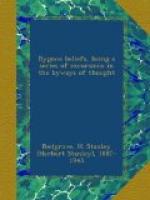[3] BENJAMIN WHICHCOTE: Moral and Religious Aphorisms OP. cit., p. 67.
[1b] JOHN SMITH: A Discourse concerning the true Way or Method of attaining to Divine Knowledge. Op. cit., pp. 80 and 96.
In what respects, it may be asked in conclusion, is the philosophy of the Cambridge Platonists open to criticism? They lacked, perhaps, a sufficiently clear concept of the Church as a unity, and although they clearly realised that Nature is a symbol which it is the function of reason to interpret spiritually, they failed, I think, to appreciate the value of symbols. Thus they have little to teach with respect to the Sacraments of the Church, though, indeed, the highest view, perhaps, is that which regards every act as potentially a sacrament; and, whilst admiring his morality, they criticised BOEHME as an enthusiast. But, although he spoke in a very different language, spiritually he had much in common with them. Compared with what is of positive value in their philosophy, however, the defects of the Cambridge Platonists are but comparatively slight. I commend their works to lovers of spiritual wisdom.



